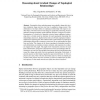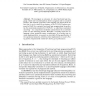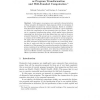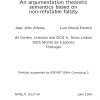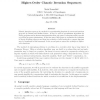114
Voted
GIS
1992
ACM
15 years 6 months ago
1992
ACM
A new approach to representing qualitative spatial knowledge and to spatial reasoning is presented. This approach is motivated by cognitive considerations and is based on relative ...
99
Voted
PLILP
1994
Springer
15 years 6 months ago
1994
Springer
In this paper we argue that hand-writing a program generator generator has a number of advantages compared to generating a program generator generator by self-application of a part...
112
Voted
GIS
1992
ACM
15 years 6 months ago
1992
ACM
134
Voted
PLILP
1994
Springer
15 years 6 months ago
1994
Springer
Abstract. We investigate an extension of a lazy functional logic language, which uses term disequations both in programs and in computed answers. The semantic properties of the lan...
PLILP
1994
Springer
15 years 6 months ago
1994
Springer
We present the design and the implementation of clp(B): a boolean constraint solver inside the Constraint Logic Programming paradigm. This solver is based on local propagation meth...
125
click to vote
NMELP
1994
15 years 6 months ago
1994
In Prz91], Przymusinski introduced the partial (or 3-valued) stable model semantics which extends the (2-valued) stable model semantics dened originally by Gelfond and Lifschitz G...
138
Voted
NMELP
1994
15 years 6 months ago
1994
In this paper, we propose a new constructive characterization of those semantics for disjunctive logic programs which are extensions of the well-founded semantics for normal progra...
175
Voted
NMELP
1994
15 years 6 months ago
1994
99
Voted
PLILP
1993
Springer
15 years 6 months ago
1993
Springer
Chaotic iteration sequences is a method for approximating fixpoints of monotonic functions proposed by Patrick and Radhia Cousot. It may be used in specialisation algorithms for ...

